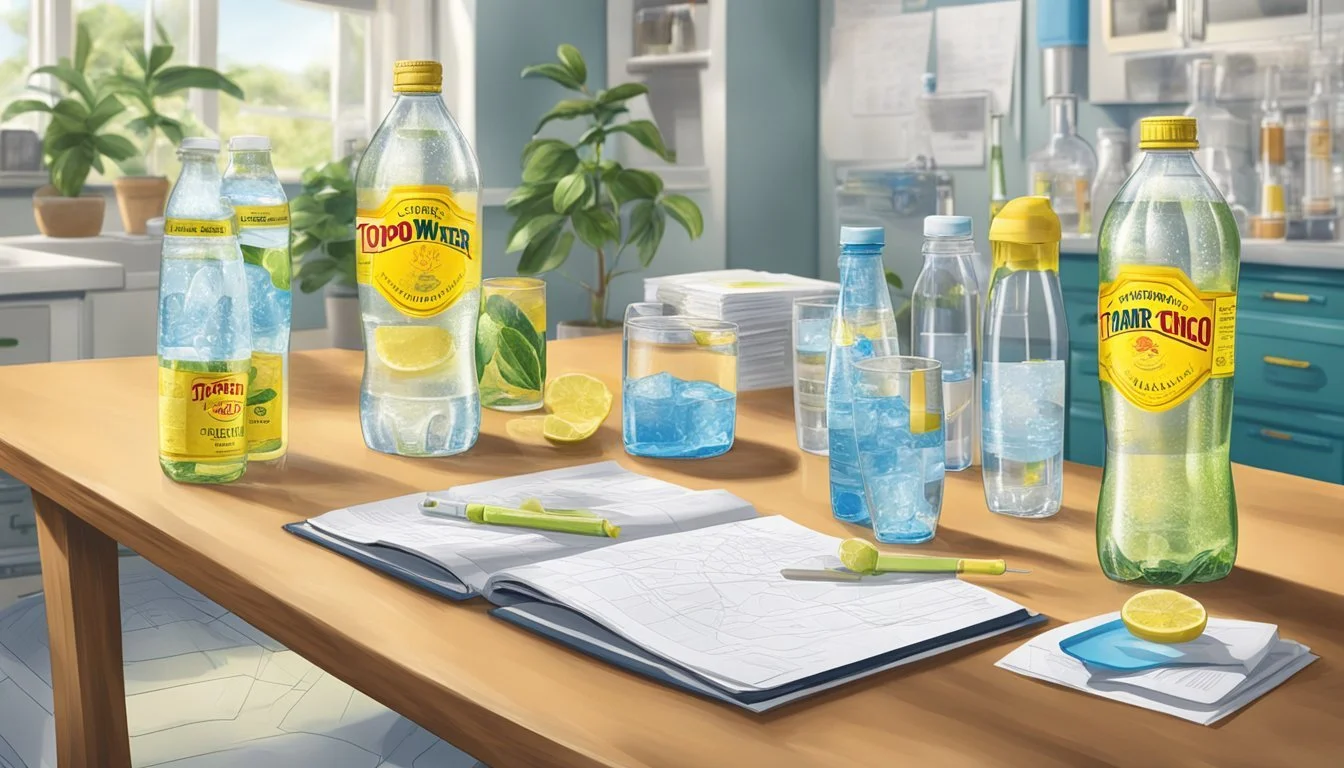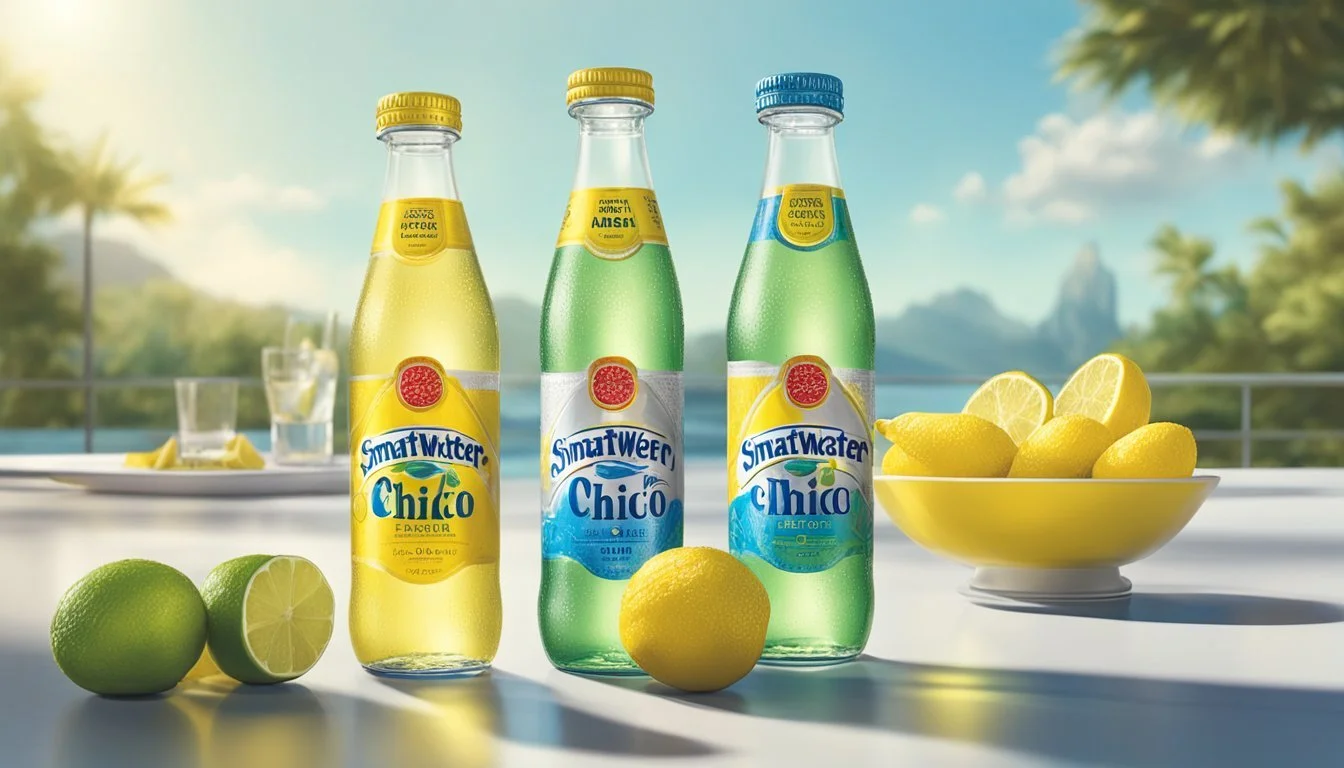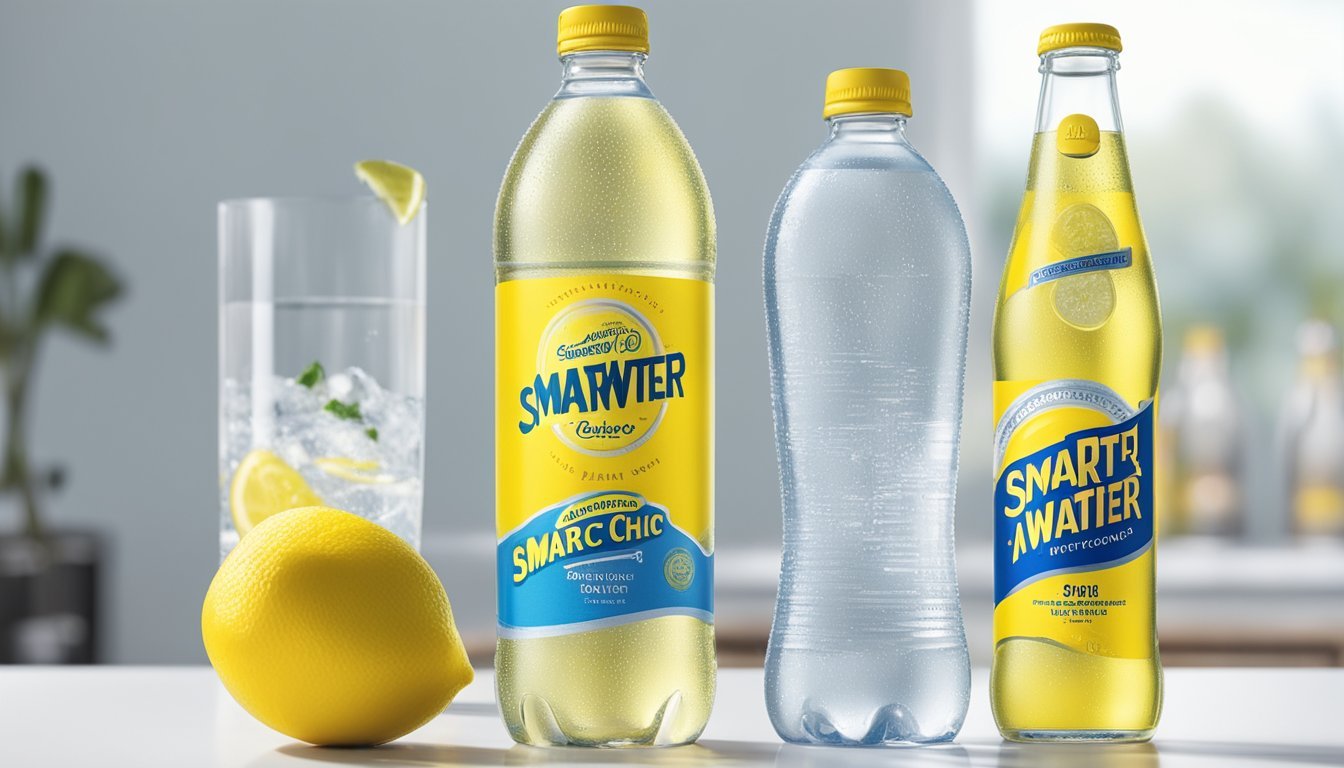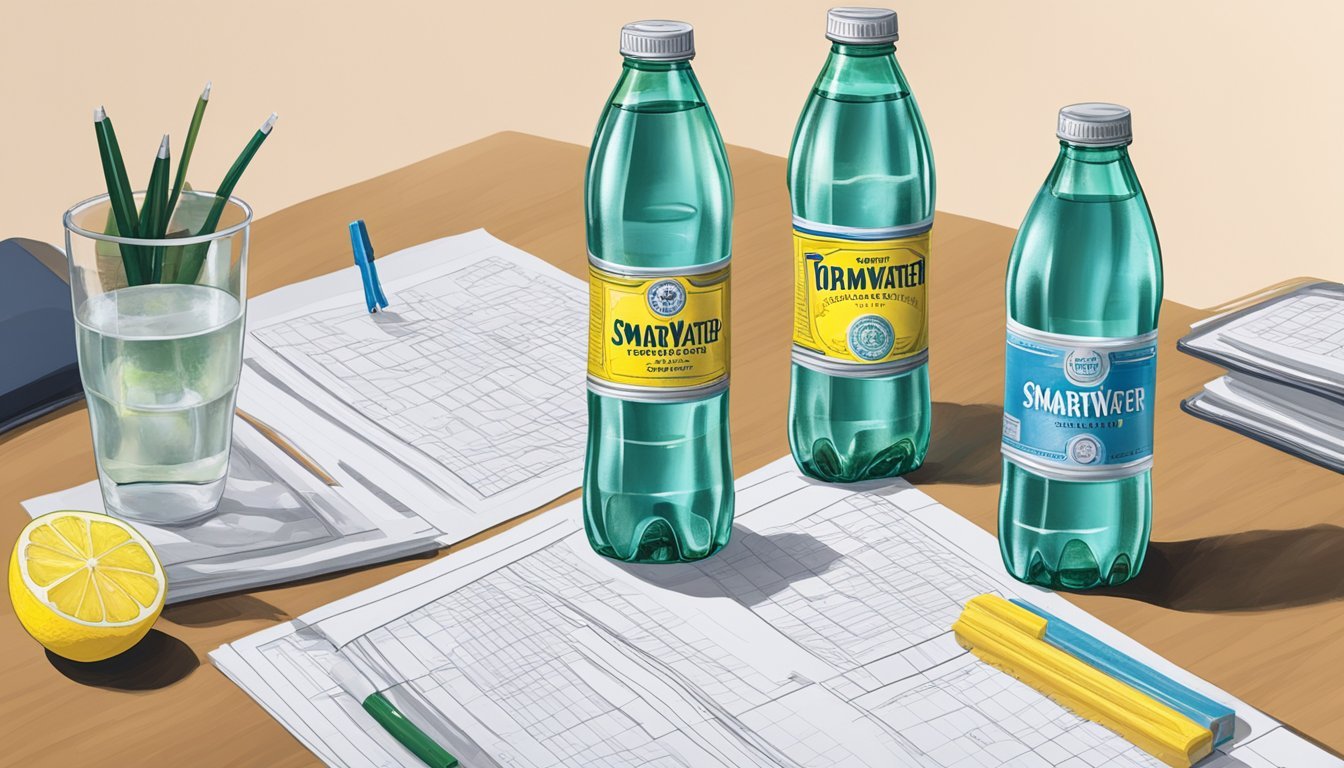Smartwater vs. Topo Chico
The Ultimate Bottled Water Comparison
Choosing the right bottled water is not just a matter of taste, but also of understanding the distinct qualities each brand brings to the table. Smartwater and Topo Chico are two prominent names that frequently come into consideration for consumers looking for hydration on the go. Smartwater, known for its vapor-distilled drinking water with added electrolytes, markets itself as a pure and crisp option. Topo Chico, on the other hand, is a mineral water praised for its natural effervescence and sourced from the Cerro del Topo Chico spring in Monterrey, Mexico. Both have carved out their niches in the bottled water market, with Smartwater appealing to those seeking added electrolytes and Topo Chico catering to lovers of its fizzy minerality.
Not only do these brands differ in taste and source, but they also offer unique health benefits and consumption experiences. Smartwater's process of vapor distillation mimics the hydrologic cycle and promises to deliver purity in its product, along with added electrolytes for taste and rehydration benefits. Conversely, Topo Chico's mineral content comes from its natural spring, offering a different suite of benefits, including a blend of minerals that some aficionados believe contribute to their overall well-being.
When comparing Smartwater and Topo Chico, one must consider factors like the purification process, presence of minerals, potential health benefits, and overall flavor profile. These aspects contribute to the decision-making process for consumers dedicated to not just quenching their thirst but also enjoying a certain quality and experience with their choice of bottled water.
Overview of Bottled Water
The bottled water industry offers a variety of water types, each with distinct sources and methods of production, and carries a significant environmental impact, predominantly through its packaging and transportation.
Types of Bottled Water
Still Water: It is the most common form lacking carbonation.
Sparkling Water: Infused with carbon dioxide gas under pressure, it includes variants like Topo Chico.
Mineral Water: Sourced from a mineral spring, it contains various minerals such as calcium and magnesium.
Purified Water: Including brands like Smartwater, it undergoes processes like distillation or reverse osmosis to remove impurities.
Environmental Impact
Plastic Bottles: The majority of bottled waters are sold in plastic bottles, contributing to plastic waste.
Glass Bottles: A more sustainable alternative, glass bottles are recyclable, but heavier to transport.
Carbon Footprint: Transport from source to point of sale makes a significant contribution to greenhouse gas emissions.
Water Extraction: Bottling companies must adhere to legal limits for water extraction to mitigate environmental impacts.
Water Sources and Production
Spring Water: Collected from a spring or a well tapping into an aquifer.
Municipal Sources: Some bottled waters use tap water, which is then filtered and treated.
Production Process: Firms must ensure their water meets certain health and safety standards before bottling.
Quality Testing: Regular testing is conducted for contaminants within legal limits to ensure safety.
Brand Histories and Ownership
Exploring the storied pasts of Smartwater and Topo Chico reveals their distinctly different origins and current ownerships, which plays a pivotal role in how these brands developed over time and are perceived in the market today.
Smartwater Background
Smartwater is a brand of bottled water produced by The Coca-Cola Company. Introduced in 1996, it was developed by the now-defunct company Glacéau. Smartwater is vapor-distilled with added electrolytes for taste and swiftly gained popularity for its crisp, clean flavor. After Coca-Cola acquired Glacéau in 2007 for $4.1 billion, Smartwater has expanded its reach globally. The brand’s innovative marketing and unique manufacturing process have positioned it as a premium water choice.
Topo Chico's Origins
Topo Chico traces its history back to Monterrey, Mexico, having been sourced and bottled since 1895. Its source is the Cerro del Topo Chico spring, lending the brand its name. The mineral water has traditionally been a favorite in northern Mexico and Texas for its refreshing taste and purported health benefits. Acquired by Coca-Cola in 2017 for $220 million, the acquisition aimed to strengthen Coca-Cola's portfolio in the premium sparkling water market. Despite its international ownership, Topo Chico maintains strong cultural ties to its origin, playing a significant role in consumer loyalty and brand identity.
Chemical Composition and Health Benefits
In evaluating Smartwater and Topo Chico, one must consider their mineral content, capacity to hydrate and provide electrolytes, and adherence to federal safety standards, all of which contribute to their overall health benefits.
Mineral Content Analysis
Smartwater is known for its vapor-distilled quality and added electrolytes for taste. It contains added minerals such as calcium chloride, magnesium chloride, and potassium bicarbonate. Topo Chico, a natural mineral water sourced from springs, naturally contains minerals like calcium, magnesium, and sodium. These minerals contribute not only to the taste but also can offer small boosts to mineral intake.
Calcium: Essential for bone health.
Magnesium: Beneficial for muscle and nerve function.
Sodium: Helps regulate body fluids.
Hydration and Electrolytes
Smartwater is designed to mimic the electrolyte composition found in the human body, making it effective for hydration. Topo Chico has a high mineral content which can help replenish electrolytes lost through sweat. Both waters have micronutrients that can aid in maintaining electrolyte balance necessary for proper hydration.
Electrolytes: Include sodium, potassium, calcium, magnesium, chloride, hydrogen phosphate, and bicarbonate.
pH: Smartwater boasts a pH between 6.7 and 7.2, while Topo Chico has a slightly alkaline pH due to its high bicarbonate content.
Federal Regulations and Safety
The Food and Drug Administration (FDA) regulates bottled water and sets limits for contaminants like heavy metals, arsenic, mercury, and PFAS chemicals. Smartwater and Topo Chico both claim to meet these standards. In terms of total PFAS levels, Topo Chico has recently made efforts to reduce them significantly but specifics on amounts should be checked against current reports.
Contaminants: Regular testing for things like heavy metals, PFAS, and arsenic is mandatory.
FDA Regulations: Bottled waters must comply with established limits on contaminants for safe consumption.
Taste Profile and Consumer Preferences
When comparing Smartwater and Topo Chico, consumers typically consider flavor variety and carbonation levels as primary factors influencing their preferences. These characteristics directly impact the overall taste experience.
Flavor Varieties
Smartwater, recognized for its vapor-distilled purity, has expanded beyond its original unflavored version to offer a selection of flavor-enhanced waters infused with various fruit extracts. They have released options like Smartwater+ Clarity with ginseng and green tea extracts, and other fruit-flavored varieties such as grapefruit, lime, and berry. These added flavors cater to consumers seeking a subtle taste along with the hydration benefits.
Topo Chico, on the other hand, is traditionally appreciated for its singular mineral water that boasts a crisp taste. However, they too have started to provide flavored options, including lime and grapefruit sparkling waters. These are favored by consumers who enjoy a stronger zest combined with the sharpness that carbonation brings.
Carbonation Levels
The carbonation level is a key differentiator between Smartwater and Topo Chico. Smartwater is known for its still water which has no carbonation, providing a smooth mouthfeel that's preferred by those who find sparkling water to be too harsh or overwhelming on the palate.
Topo Chico is a sparkling water brand renowned for its high carbonation levels, which contribute to its signature refreshing effervescence. The intense bubbles of Topo Chico give it a sharp, crisp taste that can enhance the flavor infusion of lime or grapefruit, making it a popular choice for consumers who crave a fizzy, flavorful beverage.
Packaging and Accessibility
When comparing Smartwater and Topo Chico, their packaging materials and how easily consumers can obtain these products are vital aspects to consider.
Material Comparison
Smartwater is typically packaged in plastic bottles, which are convenient and lightweight. The brand has moved towards more sustainable practices, using 100% recycled plastic for some of its offerings. However, the environmental impact of plastic is significant, as it takes a long time to degrade and can contribute to pollution if not properly recycled.
Topo Chico, on the other hand, is most famously known for its iconic glass bottles, offering a more premium feel and being 100% recyclable. Glass tends to maintain the carbonation and taste better over time but can be heavier and more fragile. Topo Chico has also introduced an aluminum can variety, which is a lightweight, recyclable option that tends to be more eco-friendly than plastic.
Material Smartwater Topo Chico Plastic Predominant packaging Available Glass Not available Iconic packaging Aluminum Not available Available
Distribution Channels
Consumers can purchase Smartwater at a wide range of retail outlets, including supermarkets, convenience stores, and online platforms. Its parent company, Coca-Cola, has a substantial distribution system that makes Smartwater widely available in various sizes and packaging options across the globe.
Topo Chico also benefits from a robust distribution network through its Coca-Cola affiliation, ensuring widespread availability. Topo Chico's distribution, while initially more geographically limited, has expanded significantly and can now be found in many of the same retail outlets as Smartwater, including online stores where customers can place orders directly.
Market Presence and Consumer Trends
In examining Smartwater and Topo Chico, one finds distinct patterns in market presence and consumer habits. Both brands have a strong consumer base but differ in their market approach and appeal.
Brand Popularity
Smartwater, with its clean and crisp branding, tends to attract consumers looking for purified water with added electrolytes for taste. It has a reputation for being a premium product within the Coca-Cola Company's portfolio. Topo Chico, on the other hand, has carved out a niche in the sparkling mineral water market and has been gaining popularity, especially with the trends toward healthier lifestyles. Topo Chico has a loyal cult following, often cited for its crisp carbonation and mineral composition.
The brand has also been recognized in the context of a popular cocktail mixer, particularly for ranch water - a Texan cocktail made with lime juice and tequila. This has bolstered its presence in both retail and bar settings. Consumer Reports has featured Topo Chico in their studies, noting a reduction in PFAS chemicals, which suggests a response to consumer health concerns and adds to its positive market presence.
Online Sales Metrics
When it comes to online sales, marketplaces like Amazon provide valuable insights into consumer preferences:
Smartwater:
High search interest
Consistently ranks in top-selling bottled waters
Positive consumer reviews highlighting taste and purity
Topo Chico:
Strong sales in the sparkling water category
Increased demand noted with growing e-commerce grocery trends
Positive feedback from consumers who prefer mineral water
The data from online sales metrics indicate that both Smartwater and Topo Chico have a robust e-commerce presence, which has been further accentuated by shifts in consumer behavior toward online shopping.
Regulatory Compliance and Industry Standards
Both Smartwater and Topo Chico are subject to rigorous oversight to ensure the safety and quality of their bottled water. These standards are set by federal and trade association regulations aimed at protecting public health.
Testing and Certification
Smartwater, produced by The Coca-Cola Company, and Topo Chico, now also owned by Coca-Cola, must adhere to specific U.S. Food and Drug Administration (FDA) regulations. The FDA classifies bottled water under its packaged food items category and sets legal limits for contaminants. Smartwater and Topo Chico are required to undergo frequent testing to confirm they meet these standards.
The International Bottled Water Association (IBWA) is another crucial industry group that both brands may choose to comply with. Although membership is voluntary, compliance with the IBWA's standards often signifies adherence to rigorous testing and certification processes that may exceed federal requirements.
Public Health Concerns
Public health concerns, particularly related to total PFAS (per- and polyfluoroalkyl substances) levels, have prompted scrutiny over bottled water. These man-made chemicals are persistent in the environment and in the human body, and there is evidence that exposure to certain PFAS can lead to adverse health outcomes.
Recent efforts by Topo Chico show a reduction in PFAS levels in response to this concern. However, consumer reports and studies indicate that there is a need for consistent and transparent testing to ensure that all bottled waters pose no risk to public health. This is especially critical as the science around acceptable levels of PFAS evolves and the legal limits for these and other contaminants may be subject to change in response to ongoing research.
Future Considerations and Sustainability
When evaluating Smartwater vs. Topo Chico, considering the stride toward eco-friendly practices and advanced water purification techniques is crucial to predict their sustainability trajectory.
Innovation in Water Purification
Both Smartwater and Topo Chico have distinct purification processes that are likely to adopt more advanced technologies. Smartwater utilizes vapor distillation—a process echoing the hydrologic cycle—to purify water, followed by the addition of electrolytes for taste. The incorporation of cutting-edge filtration methods can reduce Smartwater's industrial impact and improve the product's purity. On the other hand, Topo Chico draws its water from natural springs, and although details about its current purification measures are not extensively documented in the search results, ongoing reductions in substances such as PFAS evince a commitment to enhancing water quality.
Eco-Friendly Initiatives
In sustainability efforts, both brands have initiatives that underscore their commitment to the environment:
Smartwater:
Is packaged in bottles made from 30% plant material.
Has pledged to transition to 100% recycled plastic (rPET) bottles.
Topo Chico:
Has a closed-loop recycling system for its glass bottles, making them a green recycling choice.
Offers glass bottles that may be seen as more sustainable than plastic due to their reusability and non-reliance on petroleum-based materials, thus minimizing their BPA exposure.
Both companies are expected to intensify these efforts to maintain consumer trust and adhere to increasing environmental regulations.







